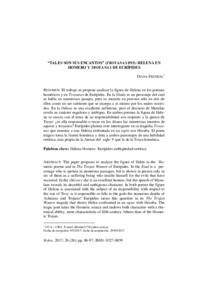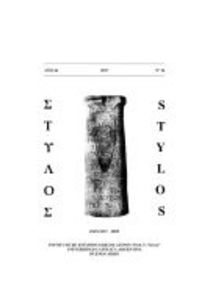Please use this identifier to cite or link to this item:
https://repositorio.uca.edu.ar/handle/123456789/9743| Título: | Tales son sus encantos” (troyanas 893) : Helena en Homero y Troyanas de Eurípides | Autor: | Frenkel, Diana L. | Palabras clave: | Homero; Eurípides, 480-406 a.C.; LITERATURA GRIEGA; RETORICA; POESIA GRIEGA; TEATRO GRIEGO; ANALISIS LITERARIO | Fecha de publicación: | 2017 | Editorial: | Universidad Católica Argentina. Facultad de Filosofía y Letras. Instituto de estudios grecolatinos "Prof. F. Nóvoa" | Cita: | Frenkel, D.L. Tales son sus encantos” (troyanas 893) : Helena en Homero y Troyanas de Eurípides [en línea]. Stylos. 2017, 26. Disponible en: https://repositorio.uca.edu.ar/handle/123456789/9743 | Resumen: | Resumen: El trabajo se propone analizar la figura de Helena en los poemas homéricos y en Troyanas de Eurípides. En la Ilíada es un personaje del cual se habla en numerosos pasajes, pero se muestra en persona sólo en seis de ellos como un ser sufriente que se increpa a sí mismo por los males ocurri-dos. En la Odisea es una excelente anfitriona, pero el discurso de Menelao revela su carácter engañoso y ambiguo. En ambos poemas la figura de Hele-na se asocia con el tema de su responsabilidad con respecto a la guerra de Troya: ¿es ella responsable o recae en los dioses las numerosas muertes de aqueos y troyanos? Eurípides plantea este interrogante en su tragedia Troya-nas que muestra a una Helena enfrentada en un agón con Hécuba. El poeta trágico toma la fuente homérica y dota a ambos personajes de una habilidad retórica, más propia de la Atenas del siglo V que la de la Troya homérica. Abstract: The paper proposes to analyze the figure of Helen in the Ho-meric poems and in The Trojan Women of Euripides. In the Iliad is a per-sonage who is spoken in numerous passages, but is shown in person only in six of them as a suffering being who insults himself for the evils that have occurred. In the Odyssey she is an excellent hostess, but the speech of Mene-laus reveals its deceitful and ambiguous character. In both poems the figure of Helena is associated with the subject of its responsibility with respect to the war of Troy: is it responsible or falls to the gods the numerous deaths of Achaians and Trojans? Euripides raises this question in its The Trojan Women tragedy that shows Helen confronted in an agon with Hecuba. The tragic poet takes the Homeric source and endows both characters with a rhe-torical ability, more characteristic of fifth-century Athens than of the Homer-ic Trojan. |
URI: | https://repositorio.uca.edu.ar/handle/123456789/9743 | ISSN: | 0327-8859 | Disciplina: | LITERATURA | Derechos: | Acceso abierto | Fuente: | Stylos Nº 26, 2017 |
| Appears in Collections: | STY - 2017 nro. 26 |
Files in This Item:
| File | Description | Size | Format | |
|---|---|---|---|---|
| tales-encantos-helena-homero.pdf | 267,53 kB | Adobe PDF |  View/Open | |
| stylos26.jpg | 106,33 kB | JPEG |  View/Open |
Page view(s)
270
checked on Apr 30, 2024
Download(s)
1,061
checked on Apr 30, 2024
Google ScholarTM
Check
This item is licensed under a Creative Commons License

